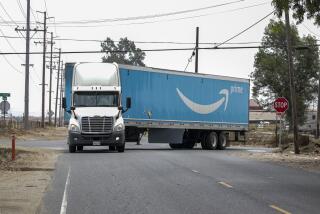Attacks Altering E-Tailing Outlook
- Share via
Online shopping has never been much of a threat to traditional retail stores. That may change if people really start to fear public places in the wake of the Sept. 11 terrorist attacks.
Shopping in this country is a form of entertainment. Gather up a couple of friends, head to the mall, hit the food court, do a bit of ogling, catch a movie and, oh, yeah, maybe buy something as long as you’re there. Or you could visit a Web site and click on some stuff while keeping your hand firmly perched on your “Mouse Pad of Solitude.”
Gee, that’s a tough call.
Things may be different now, after weeks of horrific images being pounded into our brains. People are jittery over air travel. Jetliners used to represent adventure, luxury and freedom. Now, people see planes in the air and get a hard look in their eyes. That fear has translated into open seats on airplanes, canceled hotel reservations and profound anxiety about being away from home.
It’s also put the squeeze on the one major Internet e-commerce success story: travel reservations. Getting a plane ticket or a hotel room online played to all the Internet’s strengths. You could gather up tons of information, do quick comparisons of what were essentially commodities--a seat on one airline isn’t much different from a seat on another--and save some money.
Web sites such as https://www.orbitz.com are laying people off in part because of the sudden decline in usage, but that’s not translating into a surge of work for neighborhood travel agents. People aren’t leaving Web travel sites for something else. They’re just not traveling.
The key question is how broad this aversion to movement will become. Americans are clearly nervous about flying. But are they going to worry about driving to the store?
Part of the answer will depend on what happens over the next few months. It’s clear there are many dozens more cowardly thugs hoping to blow themselves up and any American unlucky enough to be nearby.
It’s reasonable to expect more suicide attacks in the United States after the war against terrorism gets underway. Those attacks would take place at large public areas with minimal security and lots of people. Places like shopping malls.
And if that happens, e-commerce might turn into everything boosters expected it to just a few years ago.
“We may actually be entering a period when people just don’t want to go anywhere,” said Donna Hoffman, a management professor at Vanderbilt University whose eLab studies electronic commerce. “When war is declared, if gas prices go up, if being out in public is seen as dangerous, that could have a big impact on online shopping.”
There’s already been a little of that.
“We have definitely seen a slight uptick both in visitors and in sales overall,” said David Karraker, spokesman for https://www.bluelight.com, Kmart Corp.’s Web site. “And going into the holidays, we’re expecting fewer people traveling, and we think they’ll be buying gifts online, having them wrapped and delivered.”
Meanwhile, traditional retailers have seen sales drop 5% to 20% in the wake of the attacks. None of this means you should try to fish your dot-com stock out of the septic tank. Physical stores aren’t going away. But it’s clear more Americans will look on the Internet as a safe way to buy necessities in coming months.
Whether this is permanent is anybody’s guess. Wars have a way of massaging societies in ways both enduring and ephemeral. For instance, World War II saw an enormous increase in women working outside the home, but that trend quickly receded once the war was over. It didn’t reassert itself until decades later as part of broad social changes.
There is no small irony in the fact that an assault carried out by terrorists suspected to be from a regime that banned Internet access seems to be pushing Americans to use the Internet for buying stuff.
The engineers who designed the Internet made it robust enough to keep functioning even during nuclear war. They probably never imagined that the Net’s strength would be tested by millions of ordinary people buying toilet paper.
*
Dave Wilson is The Times’ personal technology columnist.
More to Read
Sign up for The Wild
We’ll help you find the best places to hike, bike and run, as well as the perfect silent spots for meditation and yoga.
You may occasionally receive promotional content from the Los Angeles Times.






